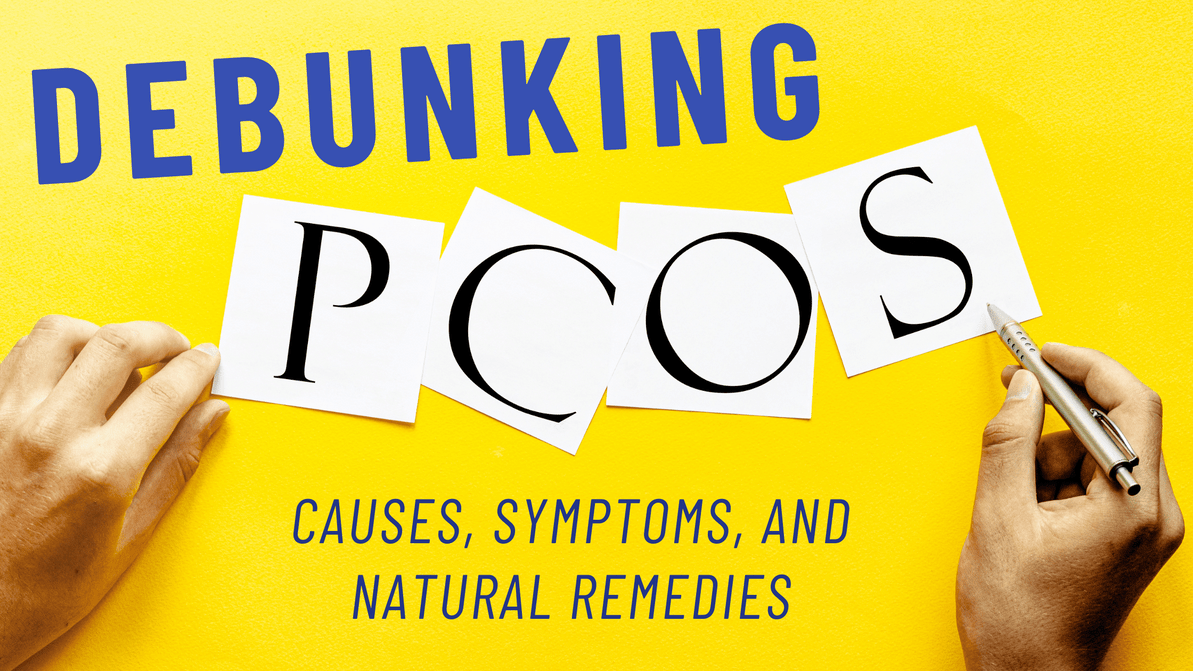Debunking PCOS—Causes, Symptoms, and Natural Remedies
Polycystic ovary syndrome, in short, PCOS, is the most common endocrine condition that affects women of reproductive age. Its symptoms include irregular cycles, weight gain or difficulty losing weight, hirsutism, and more.
The Office of Women’s Health estimates that around 1 in 10 women struggle with it in the US. That amounts to roughly 6-12%, though some studies suggest the percentage might be as high as 21%. The actual number is still most likely unknown because many women go undiagnosed due to the wide variety of symptoms.
There is no treatment for this condition. Hormonal birth control (“the pill”) may ease symptoms while you’re on it, but it is not a cure. PCOS natural remedies such as supplements, diet, and lifestyle changes can help and even put the symptoms in remission. So let’s talk about causes, symptoms, and how to support your body with simple lifestyle changes.
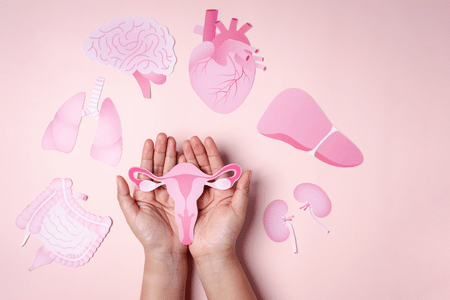
What causes PCOS?
The exact cause of PCOS is still unknown, but there are a few things that increase your likelihood of having it.
Insulin resistance
Often considered a precursor to diabetes, insulin resistance is very common among women with PCOS—up to 70% struggle with it.
When the body can’t process insulin properly, it requests more insulin. The excess triggers a response from the ovaries which produces more male hormones. The result is high androgens, the most common symptom of PCOS.
Many also consider obesity as a cause or at least a risk factor. That’s because obesity and insulin resistance often go hand in hand. Don’t be fooled, though! Even underweight can struggle with insulin resistance or PCOS.
Inflammation
Insulin resistance isn’t the only thing that can cause high androgens. Studies suggest inflammation may have the same effect. What causes inflammation? The list of causes is very long.
A diet high in inflammatory foods such as gluten, dairy, sugar, and alcohol, a sedentary lifestyle, and conditions like Celiac disease, rheumatoid arthritis, Crohn's disease, and more can all cause hormonal imbalances.
Genetics
Statistics suggest PCOS runs in families. So if one of your relatives has it, there’s a good chance you will too.

PCOS symptoms
PCOS comes with a myriad of symptoms, but you don’t have to experience all of them. The most common include:
- Irregular periods. Many women with PCOS struggle with irregular or absent ovulation, which leads to irregular or absent periods.
- Hirsutism (excess hair growth). This affects about 70% of women with PCOS and consists of excess hair growth on your chin, chest, belly, and back.
- Male-pattern hair loss. Like hirsutism, this is because of high androgens.
- Dark patches on the skin—the armpit, under the breasts, or in the groin. This is a side effect of insulin resistance left untreated for too long.
- Weight gain and difficulty losing weight.
- Polycystic ovaries.
None of the symptoms listed above is enough, on their own, for a diagnosis of PCOS. A diagnosis requires two of the following:
- High androgens
- Polycystic ovaries
- Irregular or absent periods
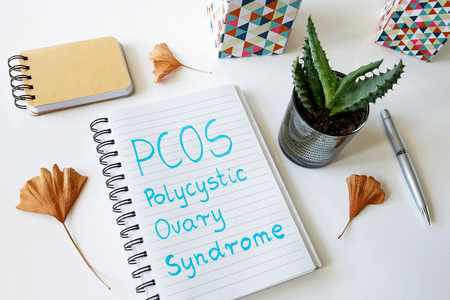
PCOS natural remedies
While you can’t cure PCOS, you can manage it through a healthy lifestyle with a balanced diet, exercise, stress management, and even supplements.
PCOS diet
As with all things diet, there’s no one-size-fits-all. If you research the topic, you’ll get overwhelmed very quickly. Some recommend low-carb diets, up to and including Keto. Others swear by vegan diets. Then there are those who recommend cutting out things like gluten and sugar. Who should you believe?
The answer begins by knowing your body and where you’re at. Do you have insulin resistance? Are you overweight? If yes, then a diet with fewer carbs but more protein and healthy fats could be beneficial.
Do you struggle with inflammation? Then cutting out inflammatory foods like gluten, dairy, sugar, and alcohol could help.
Some women find they have excellent results with intermittent fasting. Research here is limited, though. There is some evidence intermittent fasting helps with insulin resistance. But we also know a prolonged fast could lead to increased cortisol (aka the stress hormone), which can mess up your estrogen and progesterone levels.
That’s why if you want to try fasting, it’s best to start small, and if your body reacts well, increase the fasting period gradually.
There is one thing to keep in mind, though. Extremely restrictive diets can do more harm than good. To thrive, your body needs a healthy dose of carbs, protein, and good fats.
Find a diet that gives you all the nutrients you need without making you feel deprived yet allows you to maintain a healthy weight. Do your best to avoid junk food, but don’t turn it into an obsession. The true goal of a PCOS-friendly diet is to keep your blood sugar stable while helping you minimize inflammation.
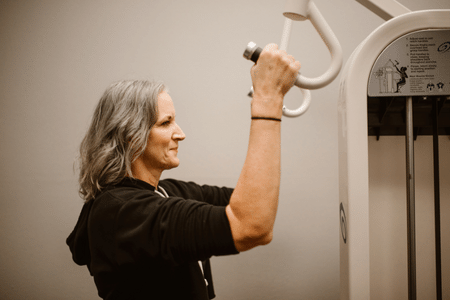
Exercising for PCOS
Like with diets, there’s no workout plan that will fit every woman with PCOS.
High-intensity interval training may benefit someone with insulin resistance, for instance. That’s not the only type of workout you should do, though. You’re probably tired of hearing this, but balance really is key.
Constantly doing high-intensity workouts can mess up your hormones as much as no exercise. Pay close attention to what your body is telling you. If you’ve never exercised before, start small. Light walks, a dance class, and lifting weights a couple of times a week are things you can do as you get used to working out.
In the end, what matters is staying active, not following a particular type of workout.
Supplements
The world of supplements for women and for PCOS specifically is wide. Tread carefully, though. While supplements don’t have severe side effects, taking the wrong one could mess up your hormones and worsen your symptoms.
Common PCOS supplements include inositol, Vitex, Saw Palmetto, NAC, and more. Each has specific uses. For instance, inositol can help with insulin resistance. Vitex may help when you have low progesterone, while NAC may help fight inflammation. A healthcare provider will help you make the best decisions for your body.
Stress management
When it comes to PCOS natural remedies, there’s a lot of talk about dieting, working out, and supplementing. But few people consider the importance of relaxing and managing stress.
Stress is one of the top hormonal disruptors. Have you ever had a stressful time in your life only to notice your period decided to make things worse through some crazy PMS, severe cramps, or just not showing up at all? That was stress messing up your hormones.
Some stress is unavoidable. But you can control how you respond to it. Balance each stressful period by relaxing, making sure you sleep enough, and taking time to have fun.

Myths about PCOS you’ll hear at least once
We can’t end this article without touching on the subject of PCOS myths. Because this is such a complex syndrome, there are many misconceptions surrounding it. Let’s quickly debunk some of the most common ones.
1. Having an irregular period means you have PCOS.
False. Irregular periods can happen for many reasons, including stress, restrictive diets, intense workouts, and traveling. If your period “disappears” for 3 months or more, check with a doctor to ensure it’s nothing serious.
For teenagers, an irregular period may be completely normal. If you’re worried, check with a doctor. But most people recommend waiting 1-2 years to see if your hormones balance on their own.
2. PCOS means I’m infertile.
False. It’s true that many women with PCOS struggle with irregular ovulation, which makes it harder to get pregnant. But PCOS isn’t synonymous with infertility.
3. If I have cysts on my ovaries, I have PCOS.
False. Ovarian cysts differ from polycystic ovaries. Over 50% of women of fertile age will get cysts at some point in their lives. Some may not even know it; some will discover them accidentally, while some will have symptoms. Most of these cysts are harmless and go away on their own, with only a few needing medical intervention.
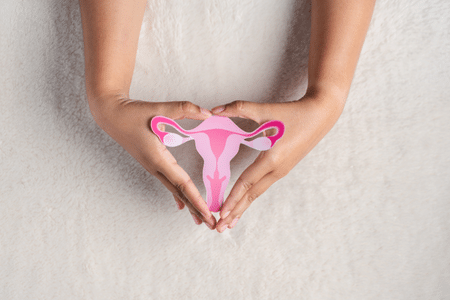
The bottom line
PCOS is a condition affecting 1 in 10 women of fertile age, but that number may be even higher. Its most common symptoms include irregular cycles, male-pattern hair loss, hirsutism, and acne.
While it can’t be cured, there are many natural remedies that include a healthy diet, moving your body, and reducing stress. Supplements can help but talk to a professional to choose the best options for your body.
PCOS is a syndrome, and it can present differently in different women. The good news is it isn’t a sentence to infertility, and with a few lifestyle changes, your symptoms may become almost non-existent.
Found this helpful? Help us spread the knowledge by sharing it with a friend!
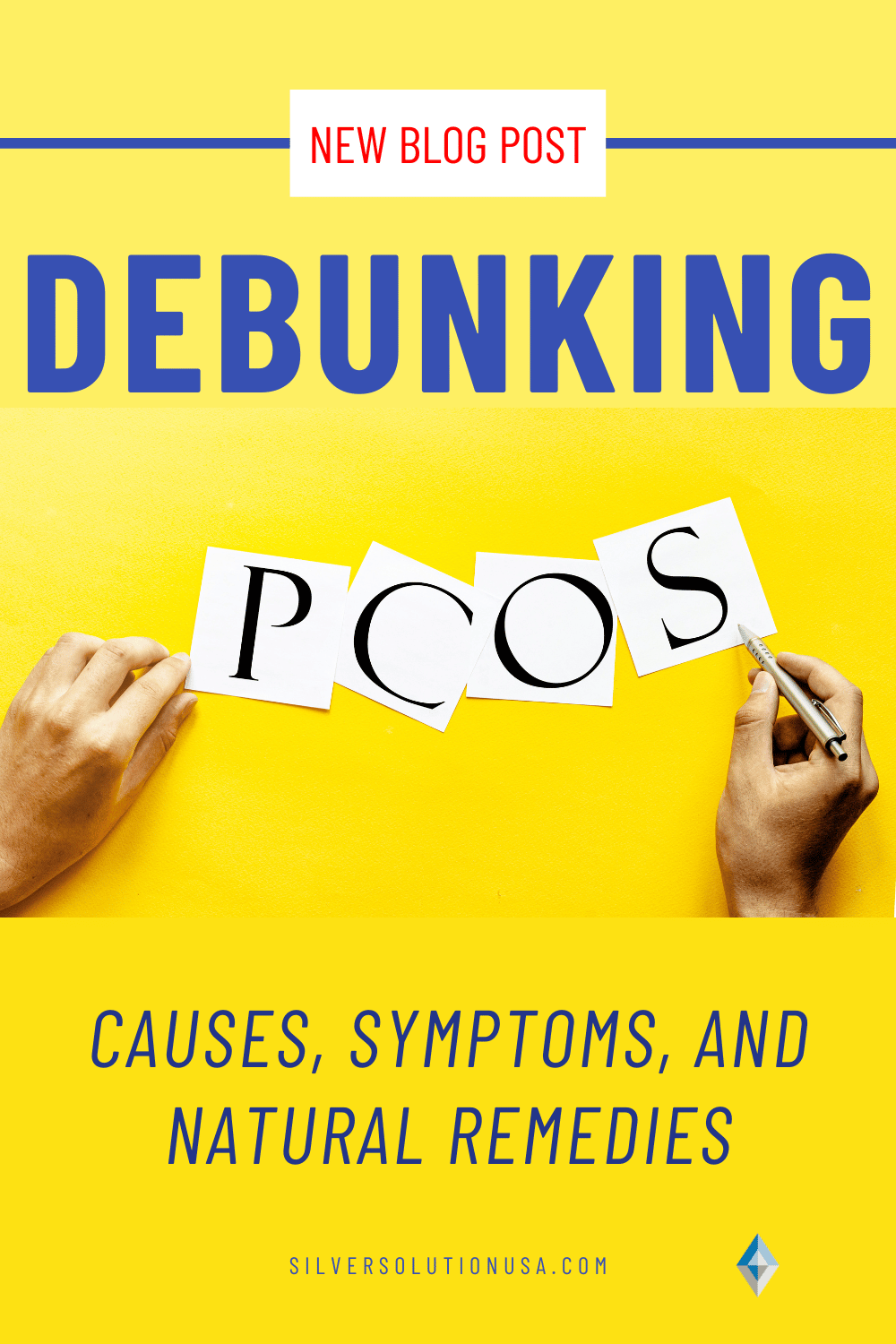
Health/Medical Disclaimer
This blog post does not provide health or medical advice. This blog post is for informational and educational purposes only and is not a substitute for professional health or medical advice. Before taking any actions based upon such information, we encourage you to consult with the appropriate medical and healthcare professionals. We do not provide any kind of health or medical advice. The use or reliance of any information contained on this blog is solely at your own risk.
Sources
https://www.womenshealth.gov/a-z-topics/polycystic-ovary-syndrome
https://obgyn.onlinelibrary.wiley.com/doi/abs/10.1002/ijgo.13125
https://www.ncbi.nlm.nih.gov/pmc/articles/PMC3277302/
https://www.ncbi.nlm.nih.gov/pmc/articles/PMC3309040/
https://link.springer.com/article/10.1385/ENDO:30:1:19
https://www.ncbi.nlm.nih.gov/pmc/articles/PMC5399492/
https://www.ncbi.nlm.nih.gov/pmc/articles/PMC2909929/
https://pubmed.ncbi.nlm.nih.gov/33849562/
https://pubmed.ncbi.nlm.nih.gov/35684143/
https://pubmed.ncbi.nlm.nih.gov/25524718/
https://www.ncbi.nlm.nih.gov/pmc/articles/PMC7739243/
https://www.ncbi.nlm.nih.gov/pmc/articles/PMC4642490/
Recent Posts
-
Are sunscreen ingredients harmful?
Sunny days can bring a lot of fun. Going out for a swim, spending time in nature, or relaxing on the …18th Mar 2024 -
The Veggie Debate: Does Cooking Vegetables Destroy Nutrients and the Best Ways to Cook Them
Vegetables are one of the healthiest foods you can choose. Some people downright hate them, while so …4th Mar 2024 -
Best Foods for COVID Recovery and Prevention
A few years ago, a new virus took the world by surprise. COVID-19 may look like the flu on the surfa …19th Feb 2024

